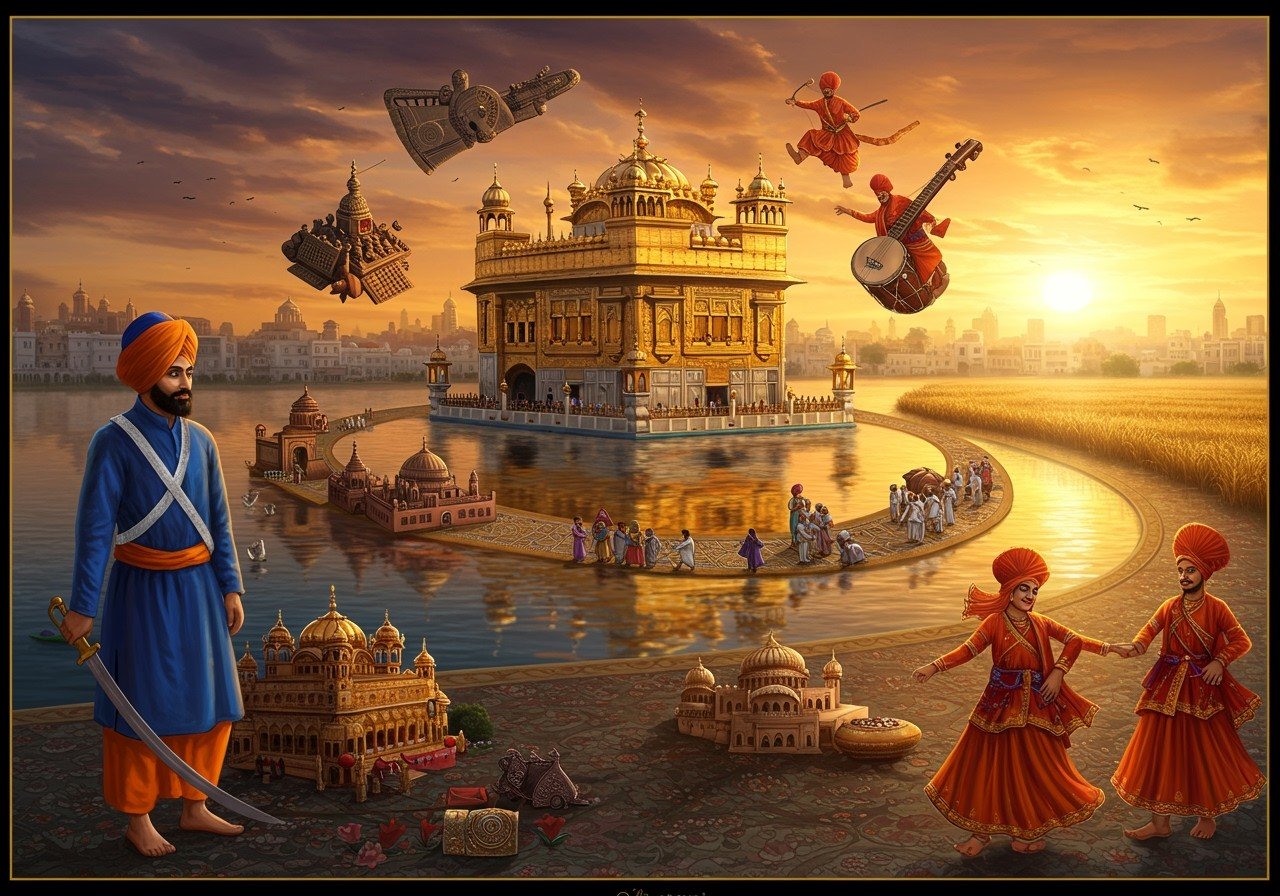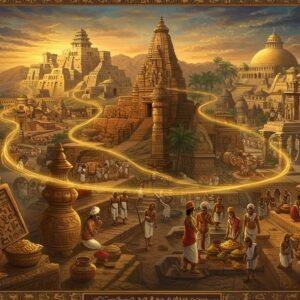
Punjab, nestled in northwest India, boasts a vibrant history and rich culture, playing a pivotal role in the subcontinent’s narrative. Known for its fertile terrain and lively traditions, Punjab has witnessed countless invasions, diverse rulers, and significant cultural shifts. This article delves into Punjab’s captivating history, catering to culturally aware Indians who cherish tradition and seek the convenience of online shopping for genuine ritual items.
Ancient Punjab: Echoes of the Past
Punjab’s story begins with the Indus Valley Civilization, around 2500 BCE. Archaeological discoveries at Harappa and Mohenjo-Daro unveil sophisticated urban planning and thriving trade. The Vedic period marked the arrival of the Aryans, with the Rigveda and other Vedic scriptures referencing the region. Buddhism and Jainism also left their mark on Punjab’s spiritual landscape. Alexander the Great’s invasion in 326 BCE further shaped Punjab’s culture and trade, leaving a lasting legacy.
Medieval Punjab: A Melting Pot of Influences
The medieval era saw the advent of Islam with the Delhi Sultanate, influencing architecture and cultural practices. In the 15th century, Guru Nanak founded Sikhism, followed by ten Sikh Gurus who further molded the faith. Maharaja Ranjit Singh’s Sikh Empire significantly impacted the region’s political and cultural scene in the early 19th century. Invasions by Afghan rulers also played a role in shaping Punjab’s socio-political fabric.
Colonial Punjab: Under British Rule
The colonial period brought Punjab under British control following the Anglo-Sikh wars. British administration introduced changes that affected Punjab’s economy and society. Punjab became a hub of the Indian independence movement, with figures like Bhagat Singh and Udham Singh leading the charge. The 1947 partition caused widespread displacement and communal strife, leading to significant socio-economic shifts and extensive rebuilding efforts.
Modern Punjab: A Blend of Tradition and Progress
Post-independence, the Green Revolution transformed Punjab’s agriculture, boosting productivity and the economy. The Punjabi diaspora has contributed significantly to global culture and commerce. Punjabi language and literature hold a prominent place in contemporary India. Regional parties and movements have shaped Punjab’s political landscape. Cultural practices, festivals, and traditions continue to flourish in modern Punjab, reflecting its enduring spirit.
Punjab’s Cultural Heritage: A Tapestry of Art and Tradition
Punjab’s rich cultural heritage encompasses music, dance, and art. Bhangra and Giddha, traditional dance forms, are celebrated globally. Punjabi folk music, featuring renowned artists like Gurdas Maan and Surinder Kaur, continues to resonate. Traditional crafts like Phulkari embroidery are highly valued. The culinary heritage boasts dishes like Sarson da Saag and Makki di Roti. Festivals such as Vaisakhi and Lohri hold deep cultural significance.
Poojn.in: Your Gateway to Authentic Punjabi Ritual Items
Poojn.in, India’s leading cultural goods and services store, offers a wide selection of authentic items connected to Punjab’s rich traditions. For traditional Punjabi ceremonies and rituals, explore our collection:
- Pure cotton Durries/Daris: Traditionally used in Punjabi homes and religious ceremonies, our durries add a touch of authenticity to your rituals. These are crafted with high-quality cotton and come in various designs and sizes to suit your needs.
- Authentic brass utensils: Essential for Punjabi religious practices, our brass utensils are crafted with precision and care. We offer a wide range of items, from diyas (lamps) and thalis (plates) to kalash (pots) and lota (water vessels), ensuring you have everything you need for your ceremonies.
- Traditional prayer items: Whether you’re looking for items for Gurudwara worship or home prayers, we offer a comprehensive selection. Find everything from rumalas (cloth coverings for religious texts) and chandoa (canopies) to incense sticks and diyas.
- Pure cotton cloth materials: Required for various Punjabi ceremonies, our pure cotton fabrics are available in different colours and textures. These are ideal for creating traditional attire or for use in specific rituals.
- Handcrafted items: Discover handcrafted items that reflect Punjab’s artistic traditions. From intricately carved wooden pieces to beautifully embroidered textiles, our collection showcases the skill and creativity of Punjabi artisans.
Visit www.poojn.in to explore our complete collection of traditional Punjabi ritual items and more. We offer pan-India delivery with secure packaging to preserve the sanctity of these items.
FAQs about Punjab’s History
What is the etymology of the name Punjab? The name Punjab originates from the Persian words “Panj” (five) and “Ab” (water), signifying “the land of five rivers.”
Who were Punjab’s earliest settlers? The Indus Valley Civilization people, inhabiting the region around 2500 BCE, are considered Punjab’s earliest known inhabitants.
What’s the significance of the Vedic period in Punjab’s history? The Vedic period marks the arrival of the Aryans and the composition of the Vedas, Hinduism’s oldest sacred texts, in Punjab.
How did Sikhism emerge in Punjab? Sikhism originated in 15th-century Punjab with Guru Nanak Dev Ji, advocating equality, justice, and devotion to one God.
What role did Maharaja Ranjit Singh play in Punjab’s history? Maharaja Ranjit Singh unified Punjab and established a strong Sikh Empire in the early 19th century.
How did the 1947 partition impact Punjab? The partition divided Punjab between India and Pakistan, causing mass migration, violence, and profound loss of life.
Why is Punjab called India’s breadbasket? Punjab’s fertile land and extensive agriculture, producing a substantial portion of India’s wheat and rice, earn it the title “breadbasket of India.”
Conclusion: Embracing Punjab’s Timeless Legacy
Punjab’s history is a testament to its resilience and vibrant culture. From ancient roots to modern progress, Punjab has undergone remarkable transformations. Understanding this journey allows us to appreciate the traditions, values, and dynamic culture that define Punjab today. Embrace Punjab’s heritage and celebrate its timeless beauty, where tradition meets the convenience of the modern world.
For further exploration of related cultural and historical topics, consider these articles:
- Leaning Temple of Huma: History, Architecture, and Mystery
- Odisha’s Sacred Sites: A Journey Through Spirituality and History
- Exploring the Divine Triangle: Kangra, Chamunda Devi, and Jwala Devi – A Spiritual Journey
To enhance your understanding of specific rituals and traditions, Poojn.in offers a curated selection of relevant products:
- Paddy (धान) Dhan: Fresh Selected Paddy Seeds for Puja
- Cotton Thread – Red, White, Yellow, Black Color – 445 Thread


